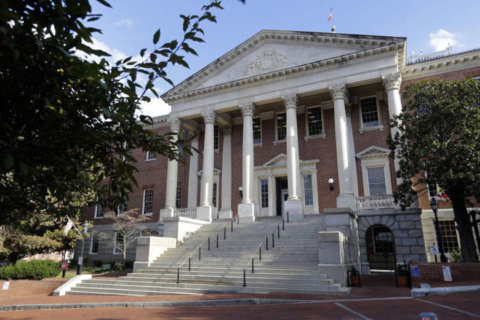ANNAPOLIS, Md. — The day before state legislative committees were to hold hearings over who should be regulating Maryland’s alcohol industry, key players in the debate held dueling news conferences featuring a healthy dose of trash talking.
On the side of the status quo, Maryland Comptroller Peter Franchot, whose office oversees the state’s alcohol enforcement unit, told reporters that the proposed legislation is “reckless, costly and unnecessary.”
At a later news conference, Del. Warren Miller, a Republican whose district includes Howard and Carroll counties, told reporters, “We’re not here to have a temper tantrum, like the guy down the street.” Miller and Sen. Ben Kramer, a Democrat from Montgomery County, are the key leaders of an effort to move alcohol regulation (along with tobacco and motor fuel) away from the comptroller’s office.
Miller said Maryland is just one of three states that has an elected official (in this case, the comptroller) who oversees alcohol regulation. “Forty-seven states, long ago, got rid of elected representatives to regulate alcohol,” Miller said. “We should join those 47 states.”
Franchot warned that pulling the enforcement unit out of his office will cost the state in a big way.
“We go through all this” he said, referring to the legislation that would transfer the regulatory authority to a commission (Senate Bill 703/House Bill 1052), “and then it’s going to cost us $50 million dollars.”
Franchot said another $750 million dollars in tobacco settlement payments could also be at risk. The comptroller’s office put out a statement earlier in the week saying the state could potentially forfeit its annual $150 million settlement payment if it is not able to prove it is not enforcing tobacco compliance. The Field Enforcement Division is currently monitored by the comptroller’s office.
Kramer led the effort to create a commission that during 2018 investigated the impact of reforming the state’s alcohol regulatory authority along with Miller. He said Franchot’s numbers are a bit high, citing an analysis from the nonpartisan Department of Legislative Services, which found that moving the alcohol enforcement unit out from under Franchot’s control would cost an initial $4 million, and $700,000 each year thereafter.
Franchot has said Kramer is interested in moving alcohol regulation away from his office because he owns a property leased to one of Montgomery County’s Department of Liquor Control retail outlets. Kramer said that has no bearing on his interest in overhauling the state alcohol control functions.
“I have challenged the comptroller: connect the dots,” Kramer said. Referring to himself in the third person, Kramer challenged the comptroller to show ‘how Ben Kramer benefits by the introduction and/or passage of this legislation.”
The bills supported by Kramer and Miller would create the Alcohol, Tobacco and Motor Fuel Commission. Along with regulating the industry, their bills would include a program to educate the public on the health impacts of alcohol consumption.






